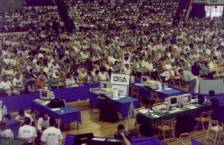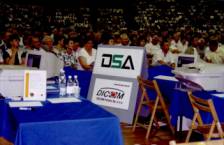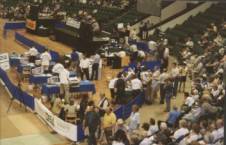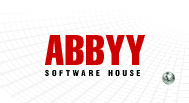ABBYY FINE READER HANDPRINT IN ARENA PROJECT
|
open PDF
|
Every
organization with more than a thousand members faced a problem
of fast processing of votes during voting procedure at least
once in its history. At the beginning of 2000 Building Society
ôOsiedle Mlodychö in Poznań, Poland, decided,
according to the verdict of α regional ±ourt, to change the
way the public utilities services were offered. The only way
to do the changes was to receive confirmation from majority of
ôOsiedle Mlodychö members during the MembersÆ meeting.
The decision was to be based upon 10 voting procedures, in which each question depended on the answers to previous one. Therefore results of each voting must have been processed very fast, because it was impossible to make thousands of ôOsiedle Mlodychö members wait for days till the end of the voting procedure. It was too difficult to input all this data manually so fast, and the only alternative was the technology of automatic data input into computer û the so called form processing technology.
There are a few companies in Poland that develop and implement image capture applications. Organizers of the Meeting contacted one of them - DSA Poland, distributor of ABBYY FineReader Handprint, form processing solution for bulk input of data from forms into computer. DSA engineers analyzed the problem and decided that the solution û processing of thousands of voting forms in minutes - was possible to implement.
Implementation of the ôArenaö project (the meeting
of ôOsiedle Mlodychö members was to take place on a large
stadium in Poznań) needed to be carefully prepared û
the concept, the voting cards, software and hardware, staff
and procedures, etc. See details on the ôArenaö project
below.
Arena project preparation
Voting cards
As far as the number of Members attending the Meeting was
unknown, the Board decided to prepare
15.000 sets of ôVoting Cardsö, containing 24 different cards
each. So there were 360 thousand separate cards prepared. |
Building Society ôOsiedle Mlodychö in Poznań - society of over 40 thousand Members representing almost 100 thousand people living in different areas of the Poznań City




Personal note
ôI would like to thank the Companies supporting us in preparation of ARENA project. I really appreciate all the efforts made to run the biggest ôlive scanningö in Poland without problems. Especially I would like to thank personally Mr. Michal Banaszynski and Mr. Jacek Jumutz from DICOM Poland, and Mr. Tomasz Kulczynski from KODAK Poland.ö
Piotr Chalawa
/President of DSA Polska/ |
Every of 15.000 sets contained:
- 2 cards with 30 checkmarks and one unique number to read,
- 18 cards with 2 checkmarks and one unique number to read,
- 4 cards with 16 checkmarks and one unique number to read,
Cards were printed in DIN A5 size on thick paper (150 g/cm2.) The unique number was unique for each set of cards (every 24 cards had the same number). This was to verify and alert any attempt of falsification (for example, if someone was trying to use a copy of original card to vote several times in one voting session). Each Member was assigned this unique number during the registration process. The total weight of the cards was about
2000 kilograms.
Software
The software chosen to read the cards was FineReader Handprint. A separate template was prepared for every card (24 different templates in total). The main task for the software was:
- to rotate the image and identify form template (to avoid processing cards from other voting sessions),
- to read the number and checkmarks while scanning,
- to export the results to a MS Access Database.
Hardware
There were 4 scanning stations used. The scanners used were the following KODAK scanners:
- Kodak 3590
- Kodak 3510
- Kodak 3500
- Kodak 2500
Scanning stations were connected to two additional PCs for verification and results preparation. Workstation configurations used for the project varied from PII/350MHz/64MB to PIII/600MHz/128MB.
Staff (DSA/Novadys Poland)
- preparation of documents, batches (4 people)
- scanning (4 people)
- maintenance and verification (3 people)
There was also additional support from DICOM Polska (service) and Kodak Polska.
Results
The real number of Members attending the Meeting exceeded 5 thousand. The Meeting went on for 10 hours and there were 7 voting sessions during this meeting. The statistics are as follows:
|
Voting numbers
|
Summary
|
|
1
|
2 |
3 |
4 |
5 |
6 |
7 |
|
number of cards |
5082 |
5053 |
4415 |
4150 |
4060 |
3852 |
3921 |
30503 |
first card came at |
11:40 |
13:10 |
14:38 |
15:57 |
16:37 |
18:43 |
19:35 |
|
results were published at |
12:45 |
14:09 |
15:10 |
16:30 |
17:06 |
19:18 |
20:08 |
|
total proceeding time [h] |
01:05 |
00:59 |
00:32 |
00:33 |
00:29 |
00:35 |
00:33 |
04:46 |
first batch preparation [min] |
3 |
3 |
2 |
2 |
2 |
2 |
2 |
16 |
scanning time [min] |
20 |
18 |
17 |
15 |
13 |
15 |
16 |
114 |
reading time [min] |
43 |
35 |
19 |
18 |
13 |
15 |
16 |
159 |
verification time [min] |
19 |
21 |
11 |
13 |
14 |
18 |
15 |
111 |
scanning speed [ppm] |
254,1 |
280,7 |
259,7 |
276,7 |
312,3 |
256,8 |
245,1 |
267,8 |
scanning capacity [pph] |
15246,0 |
16843,3 |
15582,4 |
16600,0 |
18738,5 |
15408,0 |
14703,8 |
16070,0 |
reading speed [ppm] |
118,2 |
144,4 |
232,4 |
230,6 |
312,3 |
256,8 |
245,1 |
192,0 |
reading capacity [pph] |
7091,2 |
8662,3 |
13942,1 |
13833,3 |
18738,5 |
15408,0 |
14703,8 |
11521,9 |
The average scanning speed:16 070 pages per hour
The average reading speed: 11 520 pages per hour
Notes
To get better reading speed we were changing some rules from session to session:
(a) As the preparation time allow as forming batches as ôface-upö, we consequently changed the scanning mode from duplex to simplex. During the last voting sessions the simplex mode had been turned on on all scanners. It increased reading speed and template matching. Cards from the last 4 voting sessions were read with the same speed as scanning.
(a) As the preparation time allow as forming batches as ôface-upö, we consequently changed the scanning mode from duplex to simplex. During the last voting sessions the simplex mode had been turned on on all scanners. It increased reading speed and template matching. Cards from the last 4 voting sessions were read with the same speed as scanning.
For more information please contact:
DSA Polska û Cyfrowe Systemy Archiwizacji Sp. z o.o.
A part of ôNOVADYS Internationalö Group
ul. Warszawska 39/41, 61-028 Poznań
tel. +48(61) 650-31-21, 650-31-22
www.novadys.com
www.dsa.com.pl
biuro@dsa.com.pl
pchalawa@novadys.com
Some additional photos can be found on www.dsa.com.pl/arena
.
|

